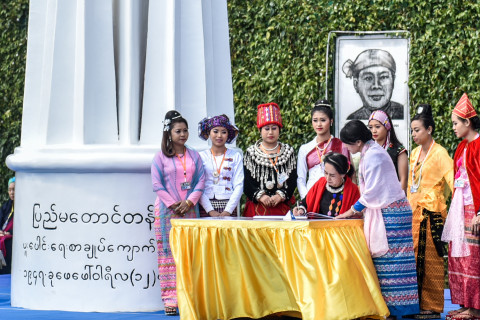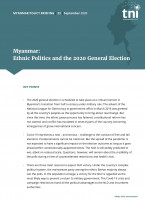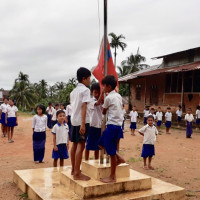The National League for Democracy: A Party for Democracy or Federalism? A Commentary by Kyaw Lynn
Regiones
As Myanmar prepares to go to the polls in November, it is a time of rising political tension. Covid-19 is spreading, while conflict continues in several ethnic states. As Kyaw Lynn argues, a key reform question remains to be answered. Will the country have federal reform and, if so, what kind?

The Irrawaddy
A political party that arose in 1988 out of the largest people’s uprising in our country’s history is now pushing its founding spirit and morality aside. The National League for Democracy (NLD) was founded on 27 September 1988 under the leadership of U Aung Shwe, U Tin Oo, U Kyi Maung, Daw Aung San Suu Kyi and U Aung Gyi. In the following years, it developed a partnership in building national reconciliation with ethnic political parties such as the Shan Nationalities League for Democracy (SNLD) led by Hkun Htun Oo and the Arakan League for Democracy (ALD) led by U Saw Mra Aung. For a moment, a breakthrough in achieving peace and democracy appeared possible.
In the 1990 general election, these three parties – the NLD, SNLD and ALD – won victory in their respective areas. But the military government of the State Law and Order Restoration Council declined to transfer power and cracked down hard on pro-democracy parties. As a result, the trio decided not to participate in the political system imposed by the national armed forces (Tatmadaw). Instead, they developed a close relationship in promoting democracy, a policy that they maintained until the 2010 general election which was won by the military-backed Union Solidarity and Development Party (USDP). With the USDP taking office, they decided to cautiously watch the process of national transition instituted by the quasi-civilian government of President U Thein Sein.
Until this time, the main strategy of the NLD was collaboration with other pro-democracy and ethnic political parties in the struggle against military or military-backed rule. These policies, however, have changed constantly following the party’s landslide victory in the 2015 general election, which took place under the terms and conditions of the 2008 constitution that protect the Tamadaw as an autonomous institution in national politics. These special rights greatly restrict the abilities of the winning party to govern in areas of critical importance to the country’s future, including the peace, borderland and security sectors (see below).
Despite these limitations, there are policy areas where the NLD could have demonstrated its influence in support of progressive change. Under the 2008 constitution, the NLD has the right to choose the central and local governments at all levels of the legislatures. But, following its 2015 victory, the party barely acknowledged election success by nationality parties in the ethnic states. This exclusion has proven a key failing.
Two outstanding cases are the Arakan National Party (ANP) in Rakhine (Arakan) State and the SNLD in Shan State. In a meeting between NLD and ANP officials after the election, ANP leaders recall that Daw Aung San Suu Kyi said that she alone would decide and take responsibility for Arakan affairs. She also asked why a Rakhine party did not demand the installation of a nationality government following the 2010 election that brought President Thein Sein to power. Rather, she asked, why were they only calling for it now after the NLD victory? ANP leaders replied that they saw a big difference between Thein Sein and Aung San Suu Kyi. They said that they were fond of her and considered her as their friend.
Subsequently, the NLD government chose a veteran Rakhine politician, U Aye Tha Aung, to act as the Vice-Speaker of the Upper House (Amyotha Hluttaw) in the national parliament. But this decision was made without transparent discussion or agreement with the ANP. It therefore appeared to local peoples that the NLD was only doing this so it could claim that ethnic nationalities are represented in the government.
A similar story happened with the SNLD in Shan State. Here the NLD also refused to grant administrative power or representation to its former ally at the state level. Instead, party officials suggested that the SNLD should seek to take the position of an “Ethnic Affairs Minister”. This, however, would suggest that the Shan people are an ethnic minority in their own land, and the SNLD rejected this. From this experience, the SNLD leader Hkun Htun Oo said that ethnic nationality peoples should not depend on anyone among the dominant parties in national politics. We must try for our rights by ourselves, he said.
It is not only in representation in government that the NLD is failing to build national reconciliation and unity among democratic and ethnic political parties. Its activities in different parts of the country are also lining up with what is termed a “majoritarian dictatorship”. Prominent instances include the installation of the General Aung San statue in Kayah (Karenni) State and the naming of the Mawlamyine-Chaungzon Bridge as the “Bogyoke Aung San” Bridge in Mon State. Both happened despite popular protests and disagreement from the local people.
In the former case, six Karenni activists who protested against the construction of the statue received six-month prison sentences. This had the effect of undermining reconciliation between the local people and central government that is dominated by the ethnic Bamar majority. In the latter case of the Mawlamyine-Chaungzon Bridge, the NLD also used the politics of “majoritarianism” in the Union Parliament when it ignored protests by thousands of local people against ratification of the Aung San name. Said Min Aung Htoo, one of the participants in the Mawlamyine protests: “First, we want them to recognise the will of the local people. Although democracy has majority rule, it is not good for the future of the country to neglect minority wishes. The essence of democracy is destroyed.”
In Rakhine State (Arakan), meanwhile, the NLD has monopolized its majority in parliament to block proposals by Rakhine MPs concerning conflict and the plight of internally-displaced peoples. The government’s handling of the protest in Mrauk-U in January 2018 and the arrest of Dr. Aye Maung MP, who has popular support in the community, also radicalized local opinion.
Adding to the crisis, the NLD’s stand on the question of United League of Arakan-Arakan Army (ULA-AA) has shown its inflexibility in making reconciliation with non-Bamar peoples. Although the NLD government does not possesses constitutional powers to decide on military affairs, it does have political and moral authority. For example, under the previous government, President Thein Sein released the executive order to stop the war in Kachin State and it did have impact on reducing military operations there.
In Rakhine State, though, the NLD government shows no moral responsibility nor compassion over the high number of civilian deaths in the continuing conflict. Furthermore the government implements repressive and aggressive actions that have impact on the people such as shutting down the Internet and designating the ULA-AA as a “terrorist” entity. As a result, the perspective of Arakanese and other nationality peoples has shifted. They do not view the conflict as a “state versus non-state” struggle. They now see it more as an identity-based conflict between the “Bamar/Myanmar” government and Tatmadaw versus the non-Bamar peoples.
A Change in Political Stand by the NLD
Section (3) of Article (1) of the NLD 2015 election manifesto, entitled “Ethnic Affairs and Internal Peace”, describes the party’s policy as: “Strive for the establishment of a genuine federal democratic union based on the principles of freedom, equal rights and self-determination.” Section (3) of Article (1) of the NLD’s 2020 election manifesto, however, changes these terms to: “Build [a] democratic federal union with self-determination and equal citizen rights”. This change in the NLD manifesto is not simply a choice of wording but a policy change in terms of the party’s orientation towards federalism and democratic reform.
Democracy, in its simplest definition, is a system of rule by majority vote or people, whereas federalism means rule by different segments of the Union – both individually and collectively. In terms of political reform, the NLD’s new wording of “democratic federalism” indicates rule that is based on the majority will toward federalism. In contrast, “federal democracy” demands democratic reform by the equal participation of different peoples and territories in the country. This policy has not been officially debated and declared. But the NLD has unilaterally chosen this path whereby the will of the ethnic Bamar people, who comprise the majority population, will decide any future federal system. This openly contradicts the reform priority of most other democratic and ethnic political parties that prefer federal democracy.
Such kinds of policy change by the NLD on federalism and democracy will deepen the political crisis. Myanmar cannot move further into democratization without the issue of federalization being addressed. But under the hybrid “civilian-military” structure of the 2008 constitution, the Tatmadaw is guaranteed autonomous power in three key branches of national government; 25 per cent of seats in the three levels of legislative bodies (lower and upper houses of parliament, and state/region assemblies); three pre-assigned ministries (Home, Border and Defence); and judicial authority in military affairs by the Commander-in-Chief. This means that the Tatmadaw has a monopoly on decision-making powers in military, peace and security affairs, while the civilian government only has authority in political and socio-economic affairs.
The consequences for those seeking federal reform are far-reaching. Federalism demands a power division in all political, economic, social and cultural affairs. But, under the present hybrid system, the civilian government cannot deliver reform in these vital areas without the agreement of the Tatmadaw, which maintains an effective veto on constitutional change. For the moment, federal democracy looks a very uncertain prospect.
These, however, are not the only limitations against political change. Difficulties are mounting. The Tatmadaw’s position that it will not depart from “national politics” unless internal peace has been achieved is accepted by many among the ethnic Bamar population. The peace process of the Nationwide Ceasefire Agreement is also approaching exhaustion. The same is true of the opportunity for changes in the constitution that could have been fostered during the five years of the NLD in government. As a result, the Tatmadaw is gaining in determination to resist leaving from political power. Meanwhile, the NLD has itself refused to change Article 261 of the constitution in order to allow state Chief Ministers to be chosen by the state parliaments, as in a federal system, which is what ethnic nationality parties prefer.
As the clock runs down to the 2020 elections, political reform in Myanmar is blocked by a vicious circle of no federalization, no peace, no Tatmadaw withdrawal from politics, and no democratization. The conclusions are clear. There can be “no democratization without federalization”.
Could the Outcome of the 2020 Election Change the Patterns for Political Reform?
In the post-independence era of parliamentary politics, the “Union of Burma” was dominated by political parties among the ethnic Bamar majority, notably the Anti-Fascist People’s Freedom League (AFPFL) which won a landslide victory in the 1951 general election. In many respects, this was comparable to the NLD victory in the 2015 election, and the result is just the same: ignorance about the aspirations of ethnic political parties and neglect about their representation. Only following the 1960 general election, when neither the Clean nor Stable factions of the AFPFL won a supreme majority, did AFPFL leaders begin to approach the leaders of ethnic political parties for inclusion in the central government.
Arguably, the NLD has followed in the same footsteps as the AFPFL since its victory in the 2015 general election after which it marginalised the ANP and SNLD from office. At the time, the NLD won 79 percent of the total constituencies in the country, although this was reduced to 59 percent control in the Union Parliament after the inclusion of the 25 per cent of seats that are reserved for military personnel.
It will thus be important to see what will happen in the 2020 polls. Due to the party’s weak performance in bringing about peace, democracy and economic reform, it is a popular perception that the NLD will not achieve another “79 percent win” in constituencies nationwide this time around, especially in ethnic nationality areas. But, if the NLD loses 13 per cent of its seats to ethnic and smaller parties, it can no longer be a dominant or singular party in the union legislatures and government. In this case, the NLD could choose to join a block with other parties that would form the basis for a power-sharing government.
For now, however, NLD leaders have said that they would not like to form a coalition government. In contrast, many ethnic parties have merged together during the past year under the same political banner to prevent “vote-splitting” which, they believe, has lead to election defeats in the past. They have reasons for confidence. If we look at the results of the 2017 and 2018 by-elections, there were a number of constituencies that were won from the NLD – or turned – by ethnic parties in the Chin, Karen and Shan States. In the 2017 and 2018 by-elections, the NLD won only 47 and 53 percent of the constituencies respectively, and this is a significant fall in the party’s share of the vote if compared to the 79 percent victory in the 2015 polls.
The results of the 2020 elections will therefore be of critical importance. Covid-19 is only adding to the challenges in transition. The question remains, however, whether the upcoming polls will determine a shift in NLD policies on the vital issues of federalism and democracy.
Kyaw Lynn is a post-graduate student mastering in Political Science at the University of Yangon. He is also the chairperson of Political Science Association (University of Yangon) as well as one of the founders of the Amnesty Arakan Team.

